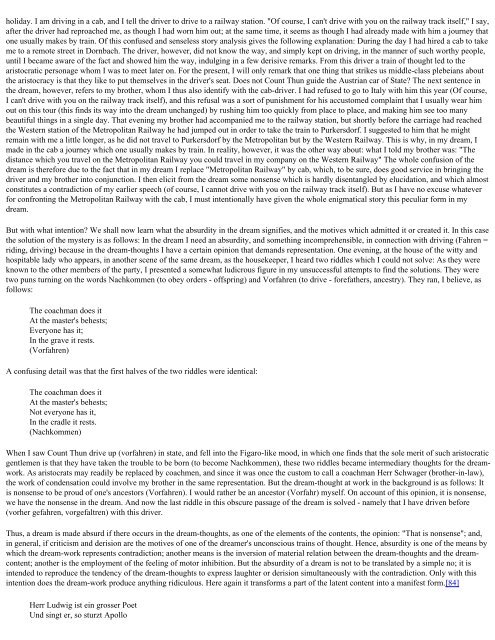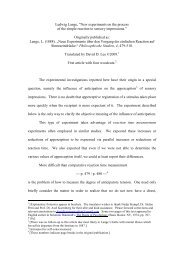The Interpretation Of Dreams Sigmund Freud (1900) PREFACE
The Interpretation Of Dreams Sigmund Freud (1900) PREFACE
The Interpretation Of Dreams Sigmund Freud (1900) PREFACE
Create successful ePaper yourself
Turn your PDF publications into a flip-book with our unique Google optimized e-Paper software.
holiday. I am driving in a cab, and I tell the driver to drive to a railway station. "<strong>Of</strong> course, I can't drive with you on the railway track itself," I say,<br />
after the driver had reproached me, as though I had worn him out; at the same time, it seems as though I had already made with him a journey that<br />
one usually makes by train. <strong>Of</strong> this confused and senseless story analysis gives the following explanation: During the day I had hired a cab to take<br />
me to a remote street in Dornbach. <strong>The</strong> driver, however, did not know the way, and simply kept on driving, in the manner of such worthy people,<br />
until I became aware of the fact and showed him the way, indulging in a few derisive remarks. From this driver a train of thought led to the<br />
aristocratic personage whom I was to meet later on. For the present, I will only remark that one thing that strikes us middle-class plebeians about<br />
the aristocracy is that they like to put themselves in the driver's seat. Does not Count Thun guide the Austrian car of State? <strong>The</strong> next sentence in<br />
the dream, however, refers to my brother, whom I thus also identify with the cab-driver. I had refused to go to Italy with him this year (<strong>Of</strong> course,<br />
I can't drive with you on the railway track itself), and this refusal was a sort of punishment for his accustomed complaint that I usually wear him<br />
out on this tour (this finds its way into the dream unchanged) by rushing him too quickly from place to place, and making him see too many<br />
beautiful things in a single day. That evening my brother had accompanied me to the railway station, but shortly before the carriage had reached<br />
the Western station of the Metropolitan Railway he had jumped out in order to take the train to Purkersdorf. I suggested to him that he might<br />
remain with me a little longer, as he did not travel to Purkersdorf by the Metropolitan but by the Western Railway. This is why, in my dream, I<br />
made in the cab a journey which one usually makes by train. In reality, however, it was the other way about: what I told my brother was: "<strong>The</strong><br />
distance which you travel on the Metropolitan Railway you could travel in my company on the Western Railway" <strong>The</strong> whole confusion of the<br />
dream is therefore due to the fact that in my dream I replace "Metropolitan Railway" by cab, which, to be sure, does good service in bringing the<br />
driver and my brother into conjunction. I then elicit from the dream some nonsense which is hardly disentangled by elucidation, and which almost<br />
constitutes a contradiction of my earlier speech (of course, I cannot drive with you on the railway track itself). But as I have no excuse whatever<br />
for confronting the Metropolitan Railway with the cab, I must intentionally have given the whole enigmatical story this peculiar form in my<br />
dream.<br />
But with what intention? We shall now learn what the absurdity in the dream signifies, and the motives which admitted it or created it. In this case<br />
the solution of the mystery is as follows: In the dream I need an absurdity, and something incomprehensible, in connection with driving (Fahren =<br />
riding, driving) because in the dream-thoughts I have a certain opinion that demands representation. One evening, at the house of the witty and<br />
hospitable lady who appears, in another scene of the same dream, as the housekeeper, I heard two riddles which I could not solve: As they were<br />
known to the other members of the party, I presented a somewhat ludicrous figure in my unsuccessful attempts to find the solutions. <strong>The</strong>y were<br />
two puns turning on the words Nachkommen (to obey orders - offspring) and Vorfahren (to drive - forefathers, ancestry). <strong>The</strong>y ran, I believe, as<br />
follows:<br />
<strong>The</strong> coachman does it<br />
At the master's behests;<br />
Everyone has it;<br />
In the grave it rests.<br />
(Vorfahren)<br />
A confusing detail was that the first halves of the two riddles were identical:<br />
<strong>The</strong> coachman does it<br />
At the master's behests;<br />
Not everyone has it,<br />
In the cradle it rests.<br />
(Nachkommen)<br />
When I saw Count Thun drive up (vorfahren) in state, and fell into the Figaro-like mood, in which one finds that the sole merit of such aristocratic<br />
gentlemen is that they have taken the trouble to be born (to become Nachkommen), these two riddles became intermediary thoughts for the dreamwork.<br />
As aristocrats may readily be replaced by coachmen, and since it was once the custom to call a coachman Herr Schwager (brother-in-law),<br />
the work of condensation could involve my brother in the same representation. But the dream-thought at work in the background is as follows: It<br />
is nonsense to be proud of one's ancestors (Vorfahren). I would rather be an ancestor (Vorfahr) myself. On account of this opinion, it is nonsense,<br />
we have the nonsense in the dream. And now the last riddle in this obscure passage of the dream is solved - namely that I have driven before<br />
(vorher gefahren, vorgefaltren) with this driver.<br />
Thus, a dream is made absurd if there occurs in the dream-thoughts, as one of the elements of the contents, the opinion: "That is nonsense"; and,<br />
in general, if criticism and derision are the motives of one of the dreamer's unconscious trains of thought. Hence, absurdity is one of the means by<br />
which the dream-work represents contradiction; another means is the inversion of material relation between the dream-thoughts and the dreamcontent;<br />
another is the employment of the feeling of motor inhibition. But the absurdity of a dream is not to be translated by a simple no; it is<br />
intended to reproduce the tendency of the dream-thoughts to express laughter or derision simultaneously with the contradiction. Only with this<br />
intention does the dream-work produce anything ridiculous. Here again it transforms a part of the latent content into a manifest form.[84]<br />
Herr Ludwig ist ein grosser Poet<br />
Und singt er, so sturzt Apollo



